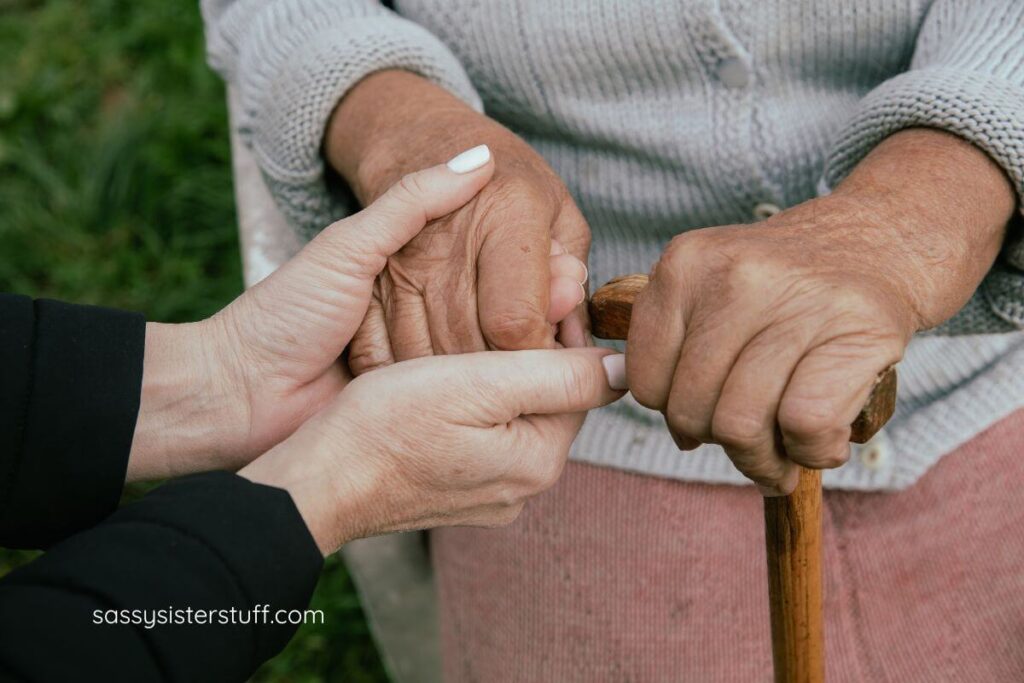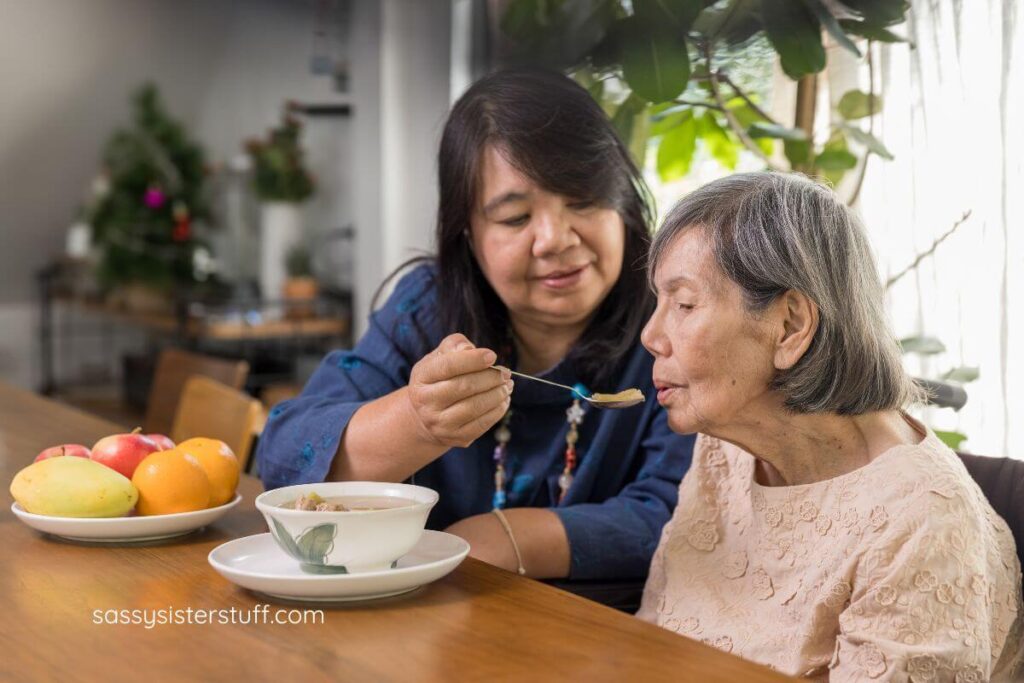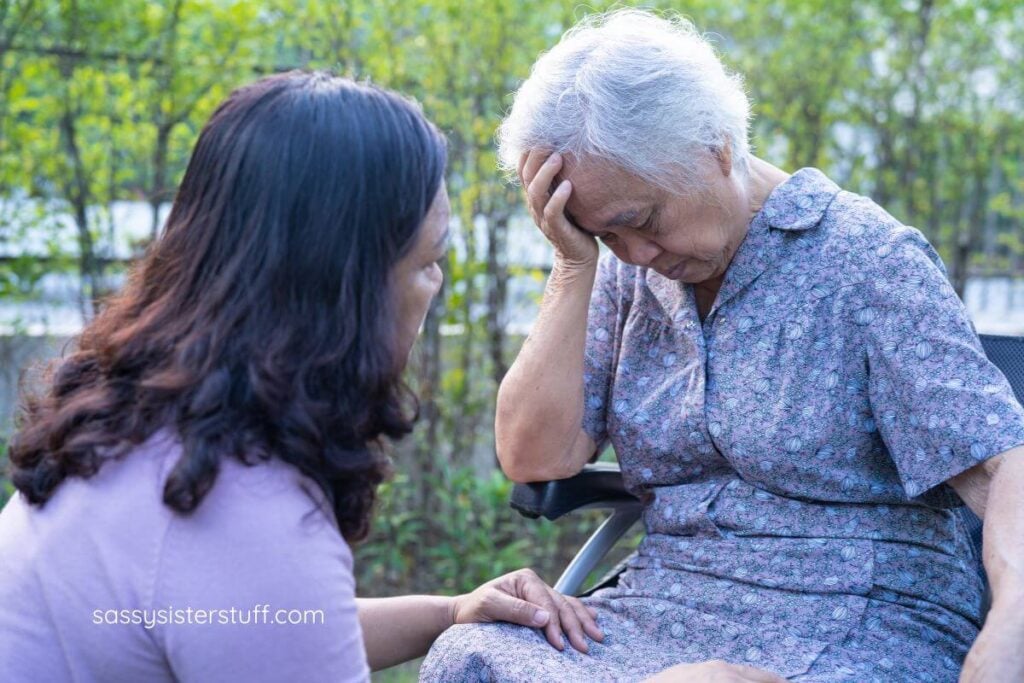Caregiving Advice: Walking Through Anticipatory Grief
Caring for a loved one often comes with emotional and physical demands but anticipating their loss can add an even heavier layer.
It’s important to understand how walking through anticipatory grief as a caregiver will honor both your emotions and the person you’re caring for. This process is deeply personal, but you’re not alone; countless caregivers face this challenge every day.

Together, let’s explore ways to cope, plan, and find strength as you walk through anticipatory grief. Use this practical advice and reassurance as you continue providing support during this challenging time.
What is Anticipatory Grief?
Anticipatory grief is the deep sadness and emotional pain you feel when you know a loss is coming — often experienced by caregivers of aging parents or loved ones with serious illnesses like dementia.
Unlike grief that follows a loss, this kind begins long before death or separation actually occurs. It’s the quiet mourning of what’s already changing — their memory, their independence, your relationship as you once knew it.
You might feel waves of sorrow, guilt, anger, or even numbness as you prepare for the inevitable. These emotions are completely normal. Anticipatory grief is a sign of your deep love and the emotional toll of caregiving.
Acknowledging your grief is the first step in honoring your feelings and finding ways to cope, connect, and care for yourself along the way.

Recognizing the Signs of Anticipatory Grief
Anticipatory grief begins long before a loss occurs, often emerging when you realize your loved one’s time may be limited.
Feelings of sadness, anger, frustration, or guilt may appear unpredictably or all at once. These emotions don’t mean you’ve given up hope or stopped caring.
Acknowledging them, however, is the first step toward managing your response. Journaling or talking with a trusted friend can help you identify and name the emotions swirling within you.
By articulating what you’re feeling, you can address the grief instead of letting it overwhelm you.
Pay attention to physical signs, such as fatigue or sleeplessness, also. If your body feels drained and your mind feels scattered, these can be indicators of anticipatory grief. Grant yourself the grace to rest and recharge when you need it.
Taking care of yourself will be what enables you to continue caring for your loved one.
Building Awareness of Emotional Triggers
Certain events or conversations may intensify feelings of grief. These triggers could be birthdays, anniversaries, or even small, day-to-day routines that remind you of what’s changing.
Identifying these emotional triggers allows you to prepare for them. For example, if a significant date is approaching, consider planning something that brings you a sense of peace or comfort, like a quiet dinner or a reflective walk.
Sometimes, triggers are less obvious. A smell, a song, or a shared activity can catch you off guard. When this happens, pause to acknowledge the moment instead of suppressing it.
Take a deep breath and remind yourself that these pangs are a sign of your deep connection to your loved one. Awareness helps you move through these emotions instead of letting them hold you down.

Seeking Support Systems
Walking through anticipatory grief is difficult to do alone. Seeking support can look different for everyone. Some caregivers find solace in sharing their experiences with close friends or family members.
Others benefit from joining caregiver support groups, whether in-person or online. No matter which avenue you choose, connecting with people who’ve gone through similar feelings can provide comfort and reduce isolation.
Professional help, such as counseling or therapy, is another option to consider. A trained professional can guide you in processing your feelings and strategizing ways to cope.
It’s not a sign of weakness to seek guidance; rather, it’s a step toward building resilience. Knowing when to lean on others allows you to share the burden instead of carrying it all on your own.
Balancing Hope and Preparation
Holding onto hope while preparing for the inevitable can feel like an emotional balancing act. It’s possible to cherish the time you have left with your loved one while also making plans for the future.
These two approaches aren’t mutually exclusive but complementary. Small gestures, such as sitting together for a quiet conversation or reminiscing about cherished memories, can create meaningful moments without denying what’s ahead.
While it may be tempting to avoid planning for this loss before it occurs, doing so can help you work through the grief you are already feeling. It may be difficult, but discussing the kind of funeral your loved one wants or talking about your own preferences regarding end-of-life ceremonies can make loss a less intimidating, looming, or alien concept.
If you are providing hospice care to someone with a prognosis of a few months or less, you might even start the process of purchasing funeral supplies, such as traditional and easy-to-store funeral bunting, with the help of your family.
Rather than diminishing your hope, these preparations empower you to face the future with greater confidence. They also provide moments of ease for your future self when the loss you are anticipating occurs.

Strengthening Present-Day Connections
The present moment is a powerful but fleeting thing. Strengthening your connection with your loved one can help you focus on the now amid the uncertainty of tomorrow.
Share stories, ask them about their life, or simply sit quietly together. These acts of togetherness often mean more than grand gestures.
Encouraging open communication is also important. You might find that your loved one wants to share their feelings but is unsure how to start. By asking gentle, open-ended questions, you create a space where they feel safe expressing themselves.
These moments of connection are gifts, both for your loved one and for you.
Practicing Self-Care Without Guilt
Caring for a loved one is demanding, and neglecting your own needs can happen without you realizing it. However, it’s important to remember that self-care isn’t selfish; it’s essential for your well-being.
Eating nourishing meals, sleeping enough, and finding moments of quiet are not luxuries but necessities.
Even small routines, like having a morning cup of tea alone or stepping outside for fresh air, can recharge your spirit.
If possible, delegate caregiving tasks to other family members or friends so you can take a break. This not only benefits you but also ensures that your loved one can receive the best care from people who are well-rested and present.

Accepting the Complexity of Grief
Grief is not a linear process, and anticipatory grief is no exception. Some days may feel manageable, while others feel impossibly heavy.
Accepting this ebb and flow is part of the healing process. Avoid pressuring yourself to “get over” or conquer grief. Instead, focus on how you can adapt and grow through it.
Remember, there’s no single “right” way to experience grief. What works for one person may not work for another. Give yourself permission to create your own path, one step at a time.
Recognizing the complexity of your emotions can help ease the pressure to feel or behave in a certain way.
Finding Meaning Amid Anticipatory Grief
One way to cope with anticipatory grief is to find meaning within it. This doesn’t mean glossing over the pain; rather, it’s about discovering purpose through the experience.
Reflecting on the love and bonds you share with your loved one can be deeply grounding. You might also find meaning in helping others, such as mentoring newer caregivers or volunteering with related organizations.
Some caregivers also explore creative outlets like writing or art to process their feelings. These methods don’t erase grief but can give it shape and perspective, making it feel less overwhelming.
Finding meaning is a deeply individual process, but it reminds you that your efforts and emotions have value.

Final Thoughts: Walking Through Anticipatory Grief with Strength
Anticipatory grief is a challenging but important part of the caregiving experience. While sorrow and uncertainty may feel overwhelming, each small step helps build resilience.
Walking through anticipatory grief as a caregiver must be done by leaning on your support systems, caring for yourself, and finding meaning and hope in both the present and the future.
These steps don’t eliminate the pain, but they help you walk through it with light and purpose.
Remember, you are not alone, and even in the hardest days, there is strength in every moment of care and love.
If this topic spoke to your heart, you might also find value in these Related Articles:
- Grief is Just Love with No Place to Go
- Models of Grief: 4 Ways to Process Your Heartache
- 53 Inspirational Healing from a Loss Quotes
Love to ALL! ~ Susan







